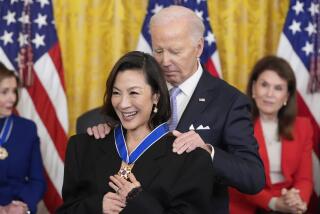Clark Fails to Make a Case for Sexism Over the ‘H Word’
Here’s the letter I’d write to Marcia Clark if I were president of the National Organization for Women (an appointment long overdue, by the way):
Dear Sister Clark,
I saw TV footage and read the transcripts of remarks made in court this week by you and Johnnie Cochran Jr., the defense lawyer for O.J. Simpson. I’m referring to the issue that flared without warning when a witness unwittingly exposed your side to a potentially unfavorable ruling.
You objected forcefully to Judge Ito. Then, according to the transcript, Cochran followed you and said to Ito: “We certainly aren’t going to yell at you, Your Honor, or become hysterical.”
According to the transcript, you responded: “I’d object to that characterization, Your Honor. That kind of personal attack is very improper and inappropriate. The court knows that it was simply advocacy. I’m not yelling at anyone. And for Mr. Cochran to make that sexist remark--’hysterical’--I take great umbrage at it.”
The purpose of my letter is to thank you for invoking “sexism” in your response. No, make that thanks a million.
Thanks for trivializing the issue of sexism in America by using it in such a personal manner. Pardon my sarcasm, but it’s born of frustration. We’ve spent years trying to convince people that sexism is a blight on society, and it only undercuts our case when the specter of it is tossed around so casually.
Aside from fighting for legal remedies for all forms of discrimination, including sexism, we are fighting to win people’s hearts and minds. That’s harder to do when you accuse Cochran of sexism for using the word hysterical. The reaction of many people is “That’s a sexist word?” The problem, Marcia, is that it simply makes it too easy for people to debunk everything we’re doing when it’s reduced to such trivia.
You know as well as I what the sexism fight is about--workplace equality, career opportunity, reproductive rights, sexual harassment, societal status, etc. Somewhere along the line, however, the definition got devalued to also include “things someone would say to a woman that they wouldn’t say to a man.”
That’s a standard that no one, including you, can hope to adhere to. It’s a path to certain hypocrisy, which is our movement’s--any movement’s--greatest enemy. Wasn’t it you, Marcia, who just a few weeks ago got big laughs when referring to F. Lee Bailey’s glove size?
By anyone’s definition, that’s a much more blatant example of saying something to one sex that you wouldn’t say to another. That remark (which, by the way, was perfectly executed on your part) suggests that you acknowledge that certain remarks are made for effect when it comes to men and women. For you now to express indignation over an arguably neutral word such as hysterical comes across as somewhat hollow.
Even Judge Ito got into the act. After you made an issue of it, someone phoned him and told him to look up the derivation of hysterical. The Associated Press dutifully reported that Webster’s Dictionary says the word comes from the Greek word hysterikos, meaning suffering in the uterus, which comes from hystera, meaning the uterus or womb.
To which the entire executive board here at NOW says: Gimme a break.
Your argument, I suppose, is that the word is gender-specific and plays into the stereotype that women get emotionally unhinged during the heat of battle and, therefore, aren’t deserving of high-pressure positions.
Only lunkheads believe that. Forgetting for a moment that AP characterized you as “nearly shouting” at one point during your argument, you should have let Cochran’s remark slide. Your mere presence as head of the prosecution team on the “trial of the century” speaks for itself regarding your ability to handle pressure.
But I’ll go you one better: I’ll concede your point that there was some gender consciousness--for lack of a better term--in Cochran’s choice of the ‘H word.’ But I refuse to cheapen the battle against sexism by calling it a sexist remark. At worst, call it a debating ploy by which he was searching out a vulnerable spot. I believe the legal term is “yanking your chain.”
And you fell for it. You didn’t strike a blow for women; you struck a blow for people whose response under pressure is to claim victimization.
By now you’re probably asking if those of us at NOW think this is so trivial, why bother writing to you at all? Why not let the moment pass into oblivion?
It’s because we feel very strongly about discrimination in all forms--racism, sexism or whatever. It’s a human rights issue, and the moral force used to eliminate it must come from an appeal to people’s best instincts. Reducing the fight to courtroom theatrics or a blanket defense in personal skirmishes sets the movement back.
We hope that upon reflection you agree.
P.S. Love the hair.
More to Read
Start your day right
Sign up for Essential California for news, features and recommendations from the L.A. Times and beyond in your inbox six days a week.
You may occasionally receive promotional content from the Los Angeles Times.






